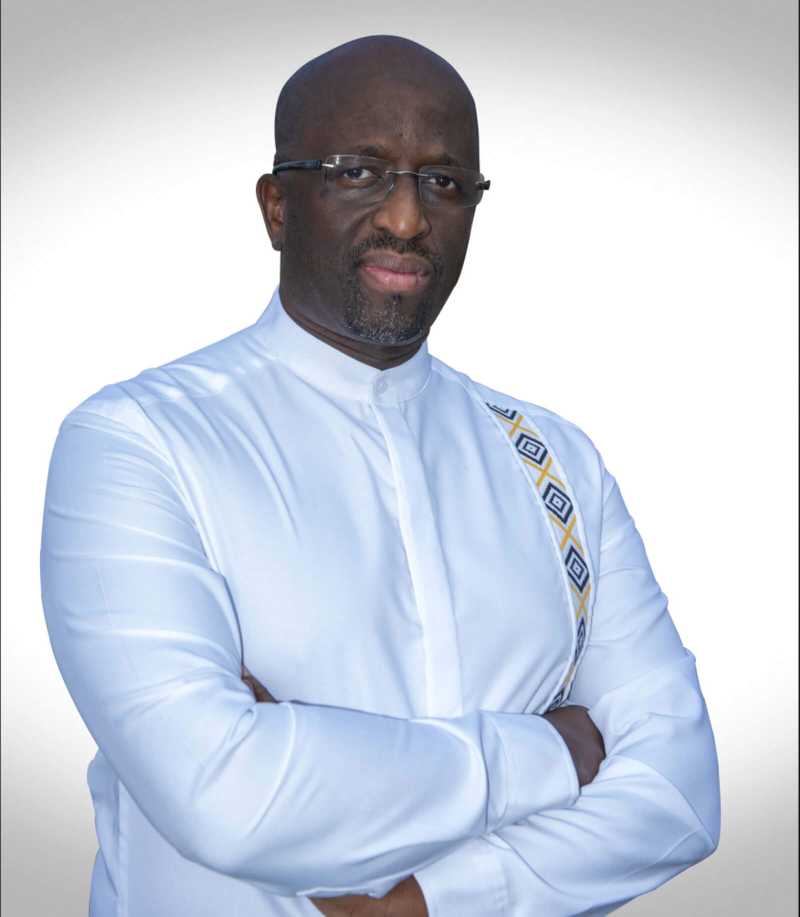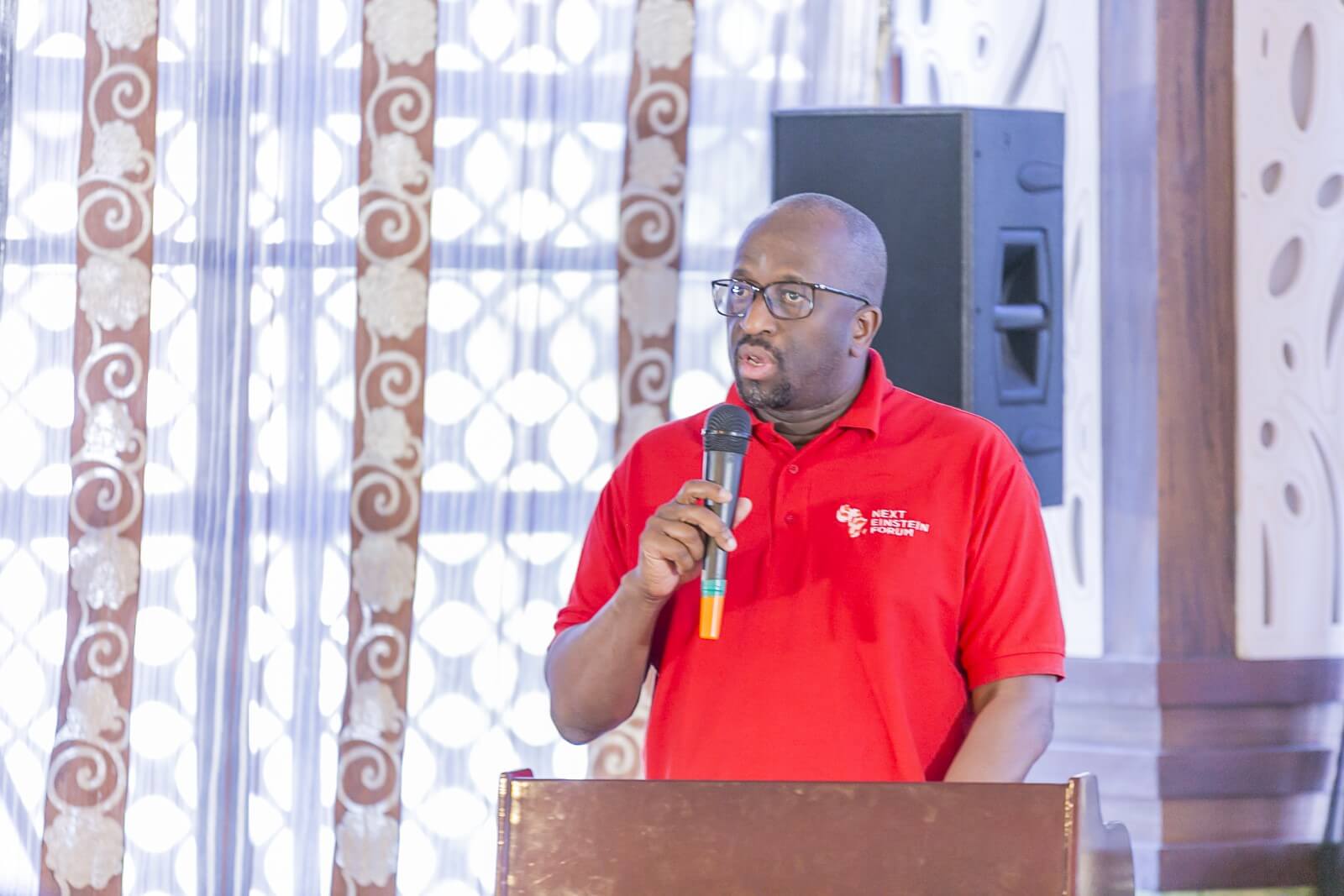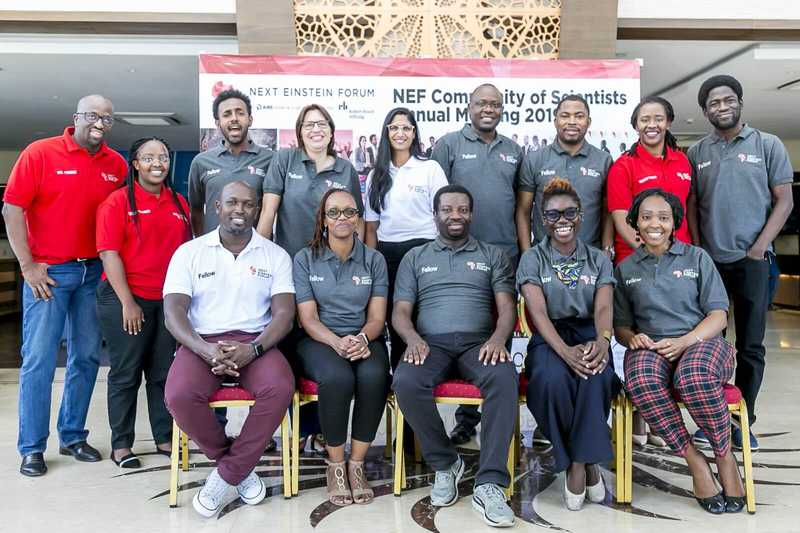
Share
Youssef Travaly is currently the Executive Chairman of AllSightsAfrica, a Think Tank and a Policy Institute. He had everything to have a successful career abroad. Yet, he left a promising career and went back to Africa. He firmly believes that Africa needs an inclusive innovation economy and he is working to realize this by fostering the connection between science, society, and business. Youssef Travaly has extensive experience in a variety of sectors, including semiconductor and biomedical research, low carbon circular economy, and climate change. He is an accomplished researcher with more than 100 publications and has experience both at a strategic and operational level in science, innovation, and public policies. He was also the Vice President of the Next Einstein Forum and the African Institute for Mathematical Sciences – Next Einstein Initiative (AIMS-NEI) global network and President of AIMS Senegal.
 Youssef Travalay with the Next Einstein Forum's community of scientists
Youssef Travalay with the Next Einstein Forum's community of scientists
Youssef Travaly went to the Catholic University of Louvain for his undergraduate studies in Mathematics and Physics. He then pursued a MSc in Applied Physics, and an M.S.E and a Ph.D. in Materials Science. After completing his Ph.D., he moved to the US to do his Postdoc at Rutgers University. He went back to Belgium upon completion and spent more than ten years as a researcher in the field of semiconductors. He has worked in the USA, Europe, and Africa with universities, research institutions, governmental and private organizations. Now, he is using all his knowledge and experience to the benefit of Africa
In this interview, Youssef Travaly tells us about his journey, work, experience, the important lessons he has learned along the way, and the advice he has for the younger generation.
 Photo credit: Youssef Travaly giving a speech at one of The Next Einstein Forum's meetings
Photo credit: Youssef Travaly giving a speech at one of The Next Einstein Forum's meetingsSeize opportunities and make sure you are an actor of the transformation of the continent from wherever you are!
Thank you for taking the time to answer our questions. Tell us about your current occupation and what your work is about.
I am currently the Executive Chairman of AllSightsAfrica, a Think Tank and a Policy Institute, which aims to become the 'Brain-Trust’ for Governments, NGO's and Private Sector organizations. My work is about fostering the connection between science, society, and business to accelerate Africa's transition to an inclusive innovation economy. AllSightsAfrica aims to "connect science to society and business," which we believe is necessary to accelerate Africa's development to an inclusive innovation economy.
You hold an impressive number of degrees. Can you enlighten our readers about your educational background?
I left Senegal in 1986 after completing high school. I went to Belgium, where I studied first Mathematics and then Applied Physics. I got my MSc in Applied Physics and then completed an MSc in Engineering (Material Sciences), followed by a Ph.D. in Material Sciences specialized in Surface Sciences and Ab Initio calculations (theoretical physics). After completing my Ph.D., I moved to the USA for a 2.5-year Postdoc at the Chemistry and Physics departments of Rutgers University, in New Jersey. I worked on several research projects, including nerve cell reconstruction involving my expertise as a surface scientist and Ab Initio calculations involving my expertise in Density Functional Theory.
How did you pay for your studies?
For the first five years, my parents and I paid for it. Teaching private maths lessons to students majoring in Economics helped me make some money. After that, I was recruited by the university as a researcher, and, therefore, received full funding. The same holds for my postdoc. I had a postdoctoral scholarship from Rutgers University.
What is your day-to-day work like as the Executive Chairman of AllSightsAfrica?
For the time being, I am in 'start-up' mode, so my work goes in all directions from content development, to building new partnerships, to strategizing on what the right business model is for a Think Tank to fundamental administrative tasks.
Can you please tell us what inspired you to set up AllSightsAfrica?
I am concerned by the fact that at the dawn of the fourth industrial revolution, I do not see drastic decisions or actions being taken to leverage the many opportunities ahead of us. Therefore, I decided to create this Think Tank where concrete and implementable solutions are offered to African governments and private sector organizations to tap in. I also believed it was crucial to train our leaders and decision-makers to understand better this complex new era of convergence between the digital, biological, and physical worlds.
Can you tell us the good habits you think were instrumental to your success?
It is imperative to have a balanced life. Your life should not be only about your work. In this stressful time, what helped me was always the combination of studies and sports activities.
Have you encountered language barriers? If so, how did you overcome them?
Yes, for sure. English was challenging when I moved to the USA. Well, there are no shortcuts. I had to learn the language. Later on, I also learned Dutch when I returned to Belgium since the research center I worked for was in the country's Flemish part. Well… I learned the language! I think that is the only solution to language barriers… learning!
Tell us a little bit about your childhood. How was it like growing up?
I grew up in several countries, including Guinee, Belgium, Gabon, and Senegal, where I spent the last years of my childhood. At that time, I believe we all grew up without "technology" in a competitive and robust education system. Our daily lives were pretty much centered around studies and sports activities. So, getting good grades was what was expected from me.
Who were your role models growing up, if any?
Interestingly mainly liberation (intellectual, people) heroes of Africa, and I hope our education systems in Africa will continue to teach these heroes' history across the continent.
What would you say to encourage young Africans to pursue scientific careers?
We have entered an era where "sciencepreneurhip" will play an increasingly important role. Young Africans have no other choice than to embrace scientific careers; otherwise, we’ll be living a new form of colonization.
What are important lessons you've learned on your way to where you are now in your career?
The main one is always to ask yourself the right and most difficult questions about where you stand. Are you happy? What are your expectations in 10, 20, or 30 years? Will you have any regrets? Will you feel like you have not tried to do this or that? The right and honest answers to these questions should guide your immediate actions.
What was the most challenging hurdle you encountered in your career? How did you overcome it?
Well, certainly one of the prejudices. Not sure if I overcame them. But something is certain, we need to change the narrative whenever possible.
Any final words for the African youth?
I envy you for being a young African Scientist today. You are living in a world and era full of opportunities. Seize these opportunities and make sure you are an actor of the transformation of the continent from wherever you are.
Know someone we should feature? Or are you of African descent and would you like to share your journey with us? Email us at editors@theafricaiknow.org
Our Newsletter
Subscribe to our newsletter to keep up with our programs and activities, learn about exciting developments in Africa, and discover insightful stories from our continent's history.